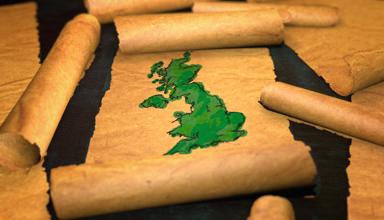On 2 February, the Northern Ireland Executive was sworn into office for the first time in two years.
This followed the publication of the Safeguarding the Union Command Paper by the UK Government on 31 January and new regulations passed on 1 February. These make changes that address the Democratic Unionist Party’s (DUP) concerns about the Windsor Framework.
Senedd Members from all parties welcomed the DUP’s decision to return to power sharing in Stormont, and restoration of devolution in Northen Ireland.
The changes will affect Wales. The Counsel General, Mick Antoniw, told the Senedd the Welsh Government will need to carefully consider the details to assess the implications.
Our articles on the Windsor Framework and Northern Ireland Protocol set out the significance of these agreements to Wales. This article summarises considerations for Wales arising from the Command Paper.
New governance structures
The Command Paper establishes new governance structures to manage the economic and regulatory relationship between Northern Ireland (NI) and Great Britain (GB).
It’s largely silent on the role of the devolved governments in Wales and Scotland within these structures. It’s not clear how they will interact with existing mechanisms established to manage the UK internal market and intergovernmental relations post-Brexit, such as Common Frameworks and reformed intergovernmental structures.
It's also unclear to what extent some of the regulatory changes proposed by the Command Paper will apply to devolved powers, governments and public bodies.
The Command Paper proposes establishing the following structures, relevant to Wales:
- An East-West Council made up of “ministers and experts from across all parts of the UK”, including business, industry and trade organisations. The Council’s work will be driven by four “economic missions” designed to tackle some of NI’s “most challenging issues”.
- As part of the Council, a new body called Intertrade UK will be established with a remit to promote intra-UK trade.
- An Independent Monitoring Panel will provide “independent oversight” of implementation and review of the Windsor Framework. The Panel will hold the UK Government and “other public authorities” to account for delivering the Framework with “no gold plating”.
- A new working group between the UK Government and the Northern Ireland Executive to consider the operation of the Windsor Framework.
- Strengthened UK ministerial structures to “monitor and assure pragmatic implementation of the new arrangements and to identify and consider potential areas of divergence”. It’s unclear how devolved responsibilities will be considered.
- A new role for the Office for the Internal Market to monitor impacts for NI arising from relevant future regulatory changes, which is likely to include Welsh legislation.
- Public authorities will be required to include Internal Market Assessments as part of any Regulatory Impact Assessment, to consider “whether measures would have an adverse impact on the UK’s internal market”.
Legislation
The UK Parliament passed legislation on 1 February to implement a number of the commitments made in the Command Paper. Some of these changes will have implications for Wales.
Further legislation will be needed to fully implement other proposals in the Command Paper.
A regulation affirming Northern Ireland’s constitutional status
This regulation affirms that the Windsor Framework doesn’t alter the constitutional status of NI and the UK Parliament’s power to legislate for NI. It also includes a power to prevent the UK Government concluding UK-EU agreements requiring NI to keep pace with EU law that result in regulatory barriers between GB and NI. It also requires UK Ministers to assess if a Bill affects trade between GB and NI but this doesn’t cover Bills introduced to the devolved legislatures.
A regulation on unfettered access for Northern Ireland to the UK internal market
This regulation extends the UK Internal Market Act (UKIMA) 2020’s market access principles to goods from NI. It requires UK Ministers to issue guidance on how to comply with the duty in section 46 of UKIMA to have special regard to NI’s place in the UK internal market and customs territory. Devolved ministers must now have regard to this guidance when carrying out relevant functions.
It also tightens the definition of goods from NI that have unfettered access to the UK to prevent traders from Ireland whose goods only transit through NI from benefiting from these provisions.
Trade
The proposed changes are designed to incentivise and boost trade between NI and GB. This could have important implications for Welsh ports that link to Ireland. Scotland and England’s ports link to NI and the plans will boost connectivity between them, with no equivalent support for Welsh ports.
Trade diversions have been a concern of the Welsh Government. The Minister for Economy, Vaughan Gething, has spoken positively of work to coordinate a common approach to GB’s western seaboard to mitigate this. The UK’s new Border Target Operating Model (BTOM) and the Command Paper legislation go some way to make it easier to move NI goods to Wales via Ireland.
However, the new plans confirm there’ll be no Border Control Post (BCP) in Cairnryan, Scotland. This further reduces trade barriers along NI-GB routes, whereas trade through Welsh ports faces checks at new BCPs.
This raises another key post-Brexit consideration - the UK Government has rejected the Welsh Government’s requests to attend the Withdrawal Agreement’s Joint Committee when matters affecting Welsh ports are discussed.
The Command Paper says it will protect historic trade routes via a UK Internal Market Guarantee, without naming which routes. To do this, the UK Government commits that “more than 80% of all freight movements from GB to NI take place under the UK internal market system”.
The paper also makes ‘Not for EU’ food labelling a GB-wide requirement. This previously applied only to NI-destined food. The estimated costs of this to Welsh businesses are not clear, nor whether existing financial support will be extended. The UK Government is consulting on draft regulations that will implement this change. This is a devolved matter requiring Welsh Ministers’ consent.
The paper emphasises divergence in UK-Ireland (EU) standards, to demonstrate how NI is more aligned to GB than it is to the EU. This raises questions for the EU, which can use rebalancing/retaliatory measures in response to divergence under the UK-EU Trade and Cooperation Agreement.
Finance
The UK Government has agreed to provide over £3 billion to the Northern Ireland Executive. The UK Government says the funding will address public sector pay pressures and “provide an updated Barnett formula for Northern Ireland”. The Secretary of State for Northern Ireland, Chris Heaton-Harris, says the details of the package will be discussed with the new Northern Ireland Executive. The Counsel General said the Welsh Government will consider any financial implications for Wales.
Next steps
The Command Paper commits the UK Government to quickly put changes in place. It will need to engage and consult at pace with the Northern Ireland Executive, other devolved governments, stakeholders in the UK and the European Commission.
The European Commission has said that it “will analyse carefully” the texts published by the UK Government. The EU will need to agree to any changes to the Windsor Framework.
On Wednesday 7 February, the Senedd’s Economy, Trade and Rural Affairs Committee will take evidence on Wales’s new Border Control Posts and the BTOM from the UK Government’s Baroness Lucy Neville-Rolfe.
Article by Nia Moss, Josh Hayman and Sara Moran, Senedd Research, Welsh Parliament






